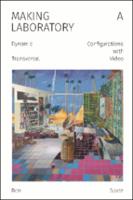Making a Laboratory
Dynamic Configurations with Transversal Video
Abstract
"Making a Laboratory defines a new audiovisual embodied research method that short-circuits experimental practice and video recording to generate new kinds of data and documents. Overturning conventional hierarchies of knowledge, “Dynamic Configurations with Transversal Video” (DCTV) grounds both discursive and audiovisual knowledges within the space of embodied practice, synthesizing insights from historical epistemologist Hans-Jörg Rheinberger and philosopher of science Karen Barad to offer the first rigorous definition of laboratoriality outside a techno-scientific paradigm. In this concise book, nonbinary practitioner-researcher Ben Spatz situates the DCTV method in the context of artistic research and alongside emerging audiovisual methods in other fields, while highlighting its unique characteristics.
Across six focused chapters, Making a Laboratory introduces DCTV as a queer feminist adaptation of Jerzy Grotowski’s “poor” theater laboratory and defines its core elements, drawing on a range of thinkers including Giorgio Agamben, Rebecca Schneider, and Hito Steyerl, in order to examine power, identity, and documentation in lab practice. Drawing from the ethical consent practices of the BDSM community, it lays the groundwork for a radical reinvention of audiovisuality from the perspective of embodiment — the audiovisual body."
Keywords
Jerzy Grotowski; video; performance arts; embodiment; cinema; queer studies; artistic researchDOI
10.21983/P3.0295.1.00ISBN
9781953035042, 9781953035035Publisher
punctum booksPublisher website
https://punctumbooks.com/Publication date and place
Brooklyn, NY, 2020Classification
Theatre direction and production
Research methods: general
Video photography / videography


 Download
Download